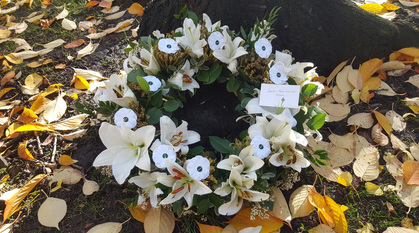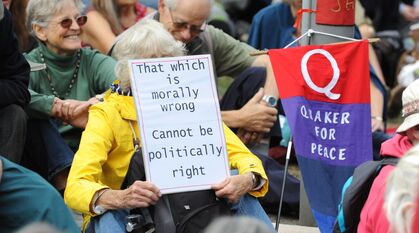Building understanding and tolerance in a divided society
Bridging divides isn't just about building unity but becoming more comfortable in our disunity, says Oliver Robertson.

We live in a divided society. We always have, to some extent, but it feels especially obvious right now. We will have to live with that, at least for the time being, but how can we do that positively? How can we build tolerance and understanding in such a situation?
In some ways it's easy to overcome division: you just need to prioritise the relationship more than your own position. You need to bite your tongue, set aside your desires and focus on preventing or avoiding conflict. You can seek peace over justice.
But something is lost if we do this in a way which hides or ignores our deepest-held values. As it says in Quaker faith & practice, "A desire for peace without truthfulness is worthless and does not bring about peace; without love truth has no effect because it is not heard".
I feel that quote describes our society today, where winning is what matters, sometimes at any cost. We must always remember that there is a time after the winning and losing, where we have to continue living together. The danger of winning at any cost is that you can throw out all your principles and shared values in the pursuit of victory, then find you do not have those shared values to bring you back together afterwards.
In this blog I want to explore how we can find those shared values with others in our lives. But I also want to emphasise how building tolerance and understanding is not the same as building unity. It is about being comfortable in our disunity.
Seeking connection
The first step to building understanding and tolerance is to recall our connectedness. This is the work of spiritual practices, from many traditions. It is the work of heart-training. If you don't have such a practice, I recommend you start. If you do, keep doing them so that you have the habit and the attitudes they ingrain for when you go out into the world.
German Friend Margarethe Lachmund, quoted in Quaker faith & practice 24.34, talks of Jesus as holding to this connectedness. "Next to the love of God, the commandment 'Love thy neighbour as thyself' is for Jesus the most essential of all commandments." As in so much else in life, we could do a lot worse than following that example, try to be Christ-like in our actions.
Speaking across divides
The practicalities of how we can do all this can be more difficult, but I want to reflect on my own experiences of trying to speak across divides. Sometimes I have done it poorly, sometimes I have done it adequately and sometimes I have done it well.
The poor times were when I wasn't listening, when I was trying to press my viewpoint and have my perspective heard; or the times when I have said nothing at all, for fear of alienating the other party or causing an argument.
The times when I have spoken adequately have been when there is a recognition of the value of the exercise, but where it was conducted mainly in a 'heady' or intellectual way. I think of some of the negotiations and quiet diplomacy meetings at the Quaker UN Office or Quaker Council for European Affairs in this way.
The most successful times have been with friends with whom there is already a closeness, an existing relationship. Key to these exchanges was an absolute commitment to the maintenance of the relationship; the issue of disagreement was not going to be a red line or breaking point. We would talk, we would listen, we would question and challenge, but in a spirit of wanting to learn how the other felt and to understand, rather than trying to convert.
It is a lot easier to build bridges when there are foundations on which to build them. This means it's important to find connections wherever they may be. Talking about how you like your tea the same way can be a connection. Spending an hour playing cards or games together can be a connection. Eating a meal together can be a connection. This is valuable for new relationships and for ones strained by division. These may seem like everyday things, but that is their strength: we already have so many of the tools we need to reach out, to overcome division. It's not something that only the skilled or the trained can do.
Opening up
Of course, if you never move beyond the superficial interactions, you may never reach a deeper understanding. That requires a more vulnerable step, of opening up about what you think and how you feel.
It may have to be you who does the opening up first, of demonstrating the kind of depth of connection you want, without any confidence that the other person will want the same. This might sound like I'm talking about a great emotive, heart-on-the-sleeve moment. Sometimes it might be but usually it isn't.
It may be quick, like the time my mother took a Christmas card round to the neighbours who had a party all night on Christmas Eve, and mentioned that it was a bit hard to sleep. It may be as simple as the moment you screw up your courage and say "well, actually…" Demonstrating difference is part of the paradox of greater connectedness – we get closer by honestly revealing our differences and having them treated tenderly.
If we are seeking understanding, then speaking up and speaking openly may be the first action, but many of the others should be about hearing from others. When we are concerned for the wellbeing of the other, for the wellbeing of the whole, we need to listen deeply, and respond. Listen deeply, and respond.
Relationships are made between people, not with our mirror images. To live alongside other people is to live with difference, and by showing that we can understand and tolerate others we can begin to breathe into being the world we want to see.
Download our Toolkit for Action: Having difficult conversations (pdf)


